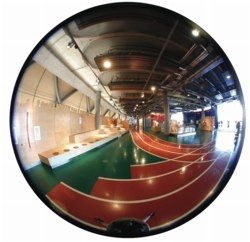Energy efficiency at the click of a mouse

By constantly improving its expertise in using the Honeywell building-management system at Glasgow Science Centre, the facilities-management team reduced last year’s energy bill by over £55 000.
Fine tuning an established building-management system can help achieve huge reductions in energy consumption. NORMAN FERGUSON explains how.The life of a building operator is full of compromises, but economic and legal considerations have brought those related to energy efficiency strongly to the fore. ‘Making do’ with the status quo is no longer an option. Changes have to be made, and that is where a building-management system (BMS) can help. Used properly, a BMS monitors energy consumption, troubleshoots problems, gathers and stores important data and provides reports that are relevant, concise and accurate. It can support corrective actions that can save money and make efficient use of labour resources — all with minimal impact on comfort and with a potential positive return to the bottom line.
Major benefits The good news is that reviewing the use of an installed BMS can have major benefits and, as Glasgow Science Centre* found out, does not have to cost the earth. Indeed, any additional BMS investment that may be required as a result of a review can soon pay for itself in terms of energy savings. It is worth pointing out that any delay in rectifying the situation represents a major opportunity lost. You cannot retrieve the energy losses and potential cost savings of today by changing the parameters of your BMS tomorrow. Recent trends in energy availability and pricing have shown us that the scenario is very volatile. To be able to cope with such volatility — to be ‘energy-management ready’ — is, therefore, the key to success. This is where it is essential to partner with a skilled control engineer, who can help implement effective correction strategies and solutions. Using the BMS for a simple review of building usage, compared to energy usage, will soon identify areas for improvement and quick wins. Heating, ventilation and air-conditioning (HVAC) control strategies can be reworked to suit current environmental requirements. Items of plant and equipment can be switched off during unoccupied hours. An important factor in the effectiveness of the recent changes to building regulations is the requirement to identify both where and how much energy is being used. Utility meters connected to a BMS enable energy wastage to be identified and reduced. Just as importantly, metering enables energy costs to be attributed to profit centres and so become the responsibility of more people.
Logging and reporting The problem for operators of established buildings may be that energy logging and reporting have not been activated in many early systems. However, enabling these capabilities is becoming an absolute necessity — not a luxury. By analysing this information, building managers can identify faults or trends in the operation of their building-services plant and take appropriate action. This may entail programming the system to automate a corrective action — removing human error and ad hoc repetition from the process and reducing the need to firefight similar future issues. The ability to communicate relevant information throughout an organisation and identify specific floors, departments or, even, offices is a powerful tool in the facility manager’s armoury. League tables, graphs, memos and emails can be powerful motivators! In a modern BMS, this information can be automatically made available directly to an individual’s desktop, thus driving home the impact of energy use. Making energy usage at work as important as the energy used (and bills received) at home may be difficult, but pulling easily understandable information from a BMS and communicating it effectively means we are well on the way to achieving something close. The effective use of a BMS relies on the manager or administrator responsible for the system actually understanding it. Accessing data, changing setpoints and investigating alarms is so much easier via today’s BMSs, which is hosted on a Windows-based PC platform — suiting people who are used to Microsoft applications. But BMS providers cannot just sit back and think their job is done by providing the product and the interface.
Training Formally training an operator is a key element of any installation, but then leaving them to get on with it leaves room for error, inconsistency and missed opportunity. It is incumbent upon the provider to make sure automated processes are in place to ensure consistency — and it is the responsibility of the customer to insist on such processes. For example, operators should be limited in the magnitude of setpoint changes and the timed extension of building services should be predictably structured. In fact, the customer should be proactively challenging his supplier to identify new ways of saving energy and cost. Maintaining high levels of energy efficiency requires ongoing effort and enthusiasm. Being able to call regularly on the support of an outside specialist can be key to gaining maximum benefit from the data generated by a BMS. But that specialist does not have to be the original installer of the BMS. It should be someone who is BMS-literate and who also understands maintenance and support (including that of the installed system) and who can call on expertise and experience gathered elsewhere. Reviewing control strategies, analysing data, then planning and implementing changes to reduce wastage could all form part of an ongoing contractual relationship that is focused on maximising energy efficiency and making the most of BMS assets. Add to that a continuous improvement programme of upgrade, migration and enhancement, and optimal efficiency is within reach. If your BMS is not assisting in making your building energy efficient, time is of the essence. Contact a specialist who comes recommended and begin to develop a way forward before it is too late.
Norman Ferguson is with Honeywell Building Solutions, The Arnold Centre, Paycocke Road, Basildon, Essex SS14 3EA.


